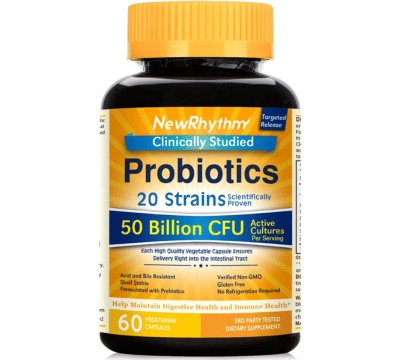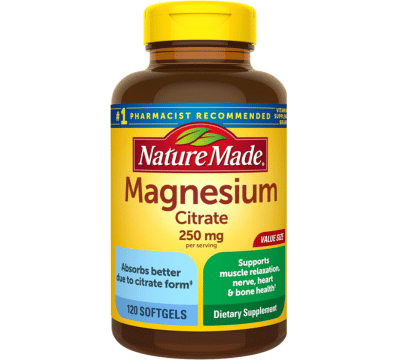Bloating can be more than an uncomfortable inconvenience; it's a sign that your digestive system may need extra help. Whether it's the discomfort after a meal or the persistent feeling of being too full, the right supplement might be the key to alleviating these symptoms. In this article, we delve into the world of supplements for bloating, providing you with a list of top picks that have been shown to relieve bloating and enhance your overall digestive health.
Understanding the underlying causes of bloating is crucial, from irritable bowel syndrome and small intestinal bacterial overgrowth to food intolerances such as lactose intolerance. By exploring how supplements like probiotics, digestive enzymes, and fiber supplements work to improve digestion and reduce symptoms, you can make informed decisions about which might work best for you. Additionally, we'll guide you through the importance of selecting supplements that contain natural ingredients backed by quality certifications and emphasize the necessity of consulting with healthcare professionals to ensure your choice is safe and effective for your specific health needs.
Key Takeaways
- Top supplements for relieving bloating include probiotics, digestive enzymes, fiber, ginger, peppermint oil, and magnesium citrate, all supporting gut health and improving digestion.
- Understanding the causes of bloating, such as dietary choices, gut health imbalances, and medical conditions, is essential for effectively addressing and preventing this discomfort.
- Choosing the right supplement involves considering natural ingredients, quality certifications, and consulting healthcare professionals to ensure safety and efficacy.
Best Supplement for Bloating: Top Picks to Relieve Discomfort

When it comes to bloating, the options are endless. But the best supplements are the ones that support gut health and give you relief from the discomfort and fullness of bloating.
From the balancing act of probiotic supplements to the bulking power of fiber, these top picks will change your digestive health and help you reduce bloating.
Introduction
Bloating makes your abdomen feel like a drum, tight and full and uncomfortable and unconfident. Research says that while diet is the foundation of good health, supplements can also be powerful tools in the fight against bloating. These additions to your daily routine work to improve digestion and get the body out of this bloating.
Remember, though, supplements are partners, not replacements for the nutrients from a whole, balanced diet.
Top Supplements for Bloating
Browsing the world of supplements for bloating can be overwhelming. Fear not; we’ve got you covered. We’ve curated a list of the best science-backed remedies proven to ease your digestive discomfort. From probiotic powerhouses to natural botanicals, these supplements will relieve bloating and support gut health and digestion.
Probiotic Supplements
Probiotics are the friendly bacteria in our gut that play a key role in digestive health. Probiotic supplements packed with various strains like lactobacillus and bifidobacterium balance the gut microbiome, leading to better digestion and less bloating.
NewRhythm Probiotic Capsules are a great example, with 50 billion CFUs of 20 strains, including prebiotic fiber, to support your digestive tract. Add these beneficial bacteria to your diet through supplements or fermented foods to support digestion and prevent bloating.

Targeted Release Technology: Stomach Acid Resistant, No Need for Refrigeration
Digestive Enzymes
Digestive enzymes are nature’s little helpers that break down food into absorbable nutrients. They are crucial for digestion; bloating can occur when our bodies don’t produce enough of a specific digestive enzyme. Supplementing with enzymes like amylase, protease, and lipase can greatly improve digestion and reduce symptoms of bloating, especially for those with enzyme deficiencies or on pancreatic enzyme replacement therapy.
For those with lactose intolerance, enzymes like lactase can be a lifesaver, break down dairy, and prevent gas and bloating.
Fiber Supplements

The importance of fiber in digestive health cannot be stressed enough. Soluble fibers like psyllium husk act as gentle brooms sweeping through our intestines, help with regular bowel movements, and prevent bloating from constipation.
Add fiber supplements to your diet gradually and with proper hydration to smooth out digestive issues and keep bloating away.
Ginger Supplements

Ginger is a spice that calms an upset stomach and a bloating buster. Ginger supplements relax the digestive tract, reduce inflammation, and speed up stomach emptying, which reduces bloating and supports digestion.
Its ability to reduce abdominal pain and distension makes it a great tool for a comfortable belly.
Peppermint Oil
Peppermint oil is a refreshing remedy used for centuries to soothe digestive issues. Its active ingredient, L-menthol, relaxes the gastrointestinal tract muscles and alleviates IBS symptoms, including bloating and stomach pain.
A study of 12 trials has even proven peppermint oil works.
Magnesium Citrate
Magnesium citrate is another bloating buster. It’s a laxative and can alleviate constipation, often caused by bloating. Promoting regular bowel movements and preventing water retention, magnesium citrate supplements like Nature Made can deflate abdominal bloating and get you back to comfort. Nature Made Magnesium Citrate is one of the top-rated Magnesium Citrates on Amazon, with 10K bottles being sold monthly. Check it out here.
What causes bloating
Before we can beat bloating, we need to understand it. Bloating can be a tricky thing and is often caused by:
- gas
- Slow bowels - Various things contribute to this uncomfortable state, including:
- food choices
- gut imbalances
- medical conditions
By understanding the causes, we can prevent and tackle bloating better.
Food
Our food choices can affect our digestive comfort. Foods that cause water retention or are high in certain carbs can cause bloating. For example, eating gassy veggies like broccoli or artificial sweeteners can disrupt digestion.
Changing our food habits, like eating slower and fewer fizzy drinks, can help with bloating and overall digestive health.
Gut Imbalances
The balance of our gut microbiome is key to our digestive health. Too much gas-producing bacteria can tip the scales and cause bloating.
Prebiotics that feed our good bacteria can help rebalance our gut and reduce bloating and overall health.
Medical conditions like exocrine pancreatic insufficiency can lead to inflammatory bowel disease (IBD) and other related conditions, including irritable bowel syndrome (IBS) and small intestinal bacterial overgrowth:
- IBS
- SIBO (small intestinal bacterial overgrowth)
- Gastroparesis
All are associated with bloating. These conditions can disrupt the normal movement of food through the digestive system and cause gas to build up and bloating.
Knowing these conditions is key to managing symptoms.
How to Choose a Supplement
Choosing the right supplement to get rid of bloating requires thought. You must review the supplement’s quality, ingredient list, and dosage based on your health needs. Consulting with healthcare professionals and choosing certified products will lead you to the best supplements for bloating that are safe and effective.
Natural Ingredients
The search for relief from bloating should take us to supplements with natural ingredients and minimal side effects. Nature has given us a treasure trove of digestive aids, from peppermint and ginger to papaya enzymes. These gifts from the earth can be gentle and effective for digestion and bloating.
Certification and Quality
Trust is key in supplements, and third-party certifications like NSF International or USP are the stamp of approval. These certifications ensure that what you’re taking is pure, potent, and contaminant-free.
Choosing certified supplements is a step towards safety and efficacy in eliminating bloating.
Consult with Healthcare Providers
When navigating the world of supplements, guidance from healthcare providers is priceless. They can give you personalized advice based on your health profile and help you choose supplements that will give you the most benefits and least risks. Always consult a professional before adding a new supplement to your regimen, especially if you regularly experience bloating or other gut issues.
Benefits and Side Effects
Supplements can be a lifesaver for those with bloating, offering various health benefits from digestion to reduced inflammation. But we need to be aware of the side effects. Overusing some supplements can cause irregular heartbeat or kidney stones.
Moderation and following recommended dosages are the key to reaping the benefits while minimizing the risks.
Health Benefits
The right supplements can be a superhero for your gut health, from balancing gut bacteria to preventing constipation. Here are some supplements that can support a healthy digestive system:
- Probiotics
- Digestive enzymes
- Fiber
- Natural anti-inflammatories like ginger
These can reduce the need for medication and overall well-being.
Remember, vitamin D supplements can also reduce bloating if you’re deficient.
Side Effects
While supplements are beneficial, they’re not risk-free. Overuse can cause side effects like diarrhea, nausea, and heartburn. Probiotic supplements can cause gas and bloating initially, and excessive fiber can cause cramps. Peppermint oil, while beneficial, can cause heartburn and acid reflux when used in excess. Use supplements wisely and monitor your body’s response.
Lifestyle Tips to Complement Supplement Use
Supplements work better when combined with lifestyle changes that support gut health. Small, mindful adjustments to our daily routines can significantly reduce bloating and enhance digestion.
Let’s explore some lifestyle tips that work hand in hand with supplements to keep your digestive process running smoothly.
Balanced Diet
A balanced diet rich in fruits, vegetables, lean proteins, and whole grains lays the foundation for digestive health. These nutrient-dense foods complement the work of digestive enzymes and provide the necessary fiber to prevent constipation and bloating.
Gradual increases in fiber, paired with ample water intake, can ensure smooth digestion and help keep bloating at bay.
Hydration
Hydration is a simple solution to bloating. Drinking enough water supports regular bowel movements, prevents water retention, and keeps your digestive system balanced.
Increasing fiber with hydration is especially important to avoid constipation, which can worsen bloating.
Regular Exercise
Regular exercise is not just good for your waistline; it’s also great for your gut. Physical activity stimulates the digestive system, helping to move gas and stool through the colon and reduce bloating. Even a simple walk can be beneficial, so make it a point to incorporate movement into your daily routine for optimal digestive health.
In Conclusion
Managing bloating effectively requires a holistic approach beyond the occasional quick fix—the key to lasting relief lies in targeted supplements, thoughtful dietary choices, and consistent lifestyle changes. By understanding the diverse causes of bloating, which range from irritable bowel syndrome and small intestinal bacterial overgrowth to common food intolerances like lactose intolerance, you can tailor your approach to suit your unique digestive health needs. Supplements for bloating, such as probiotics, digestive enzymes, and fiber supplements, play a pivotal role by supporting gut health, improving digestion, and reducing symptoms. These supplements introduce beneficial bacteria to your digestive tract, aid the digestive process, and help manage gas production, all essential for alleviating abdominal discomfort and bloating.
It's important to remember that each person's digestive system is unique, and what works for one might not work for another. Consulting with a registered dietitian or healthcare professional is crucial to ensure that the supplements and dietary changes you consider are safe and effective for your specific condition. Research suggests that integrating natural ingredients like peppermint oil and ginger, which have been shown to reduce inflammation and enhance the digestive process, into your regimen can further benefit digestive health. Additionally, adopting lifestyle habits that prevent bloating, such as regular exercise and adequate hydration, can complement your use of the best supplements for bloating. By embracing this comprehensive approach and making informed choices based on quality certifications and the latest research, you can achieve a healthier gut and a more comfortable life. Remember, the journey to digestive wellness is personal, but you can navigate it successfully with the right guidance and resources.
Finally, a Few Answers to FAQs
What are the best natural supplements for bloating?
Probiotics, digestive enzymes, fiber supplements like psyllium husk, ginger supplements, and peppermint oil are some of the best natural supplements for bloating, as they help balance gut bacteria, aid in food breakdown, prevent constipation, provide anti-inflammatory benefits, and relax the digestive tract.
How can lifestyle changes complement the use of supplements for bloating?
By incorporating lifestyle changes like eating a balanced diet, staying hydrated, and regular exercise, you can enhance the effectiveness of supplements for bloating by supporting gut health and aiding digestion. This can help prevent bloating and improve overall well-being.
Are there any potential side effects to using bloating supplements?
Yes, there can be potential side effects from using bloating supplements, such as diarrhea, nausea, heartburn, and cramping, especially when taken in excess. Sticking to recommended dosages and seeking advice from a healthcare provider is important.
How do I choose the right bloating supplement?
Choose bloating supplements with natural ingredients and certifications for quality, and consult with healthcare providers to ensure they align with your health needs.
Can exercise help with bloating?
Yes, regular exercise can help reduce bloating by promoting bowel movements and the movement of gas through the digestive tract. Walking, yoga, and abdominal massages can be particularly effective.
Thanks for taking this journey to explore the best supplement for managing bloating. If you want to add to your library of knowledge and are interested in diving deeper into the supplements mentioned in this article, you should check out the links above. It could be a huge time-saver - you won't be sorry you took a look.
Also, please return soon to check out our next review of other incredible supplements – we’re always looking out for YOU!
*We are NOT qualified medical advisors. The content here is only based on our personal opinions and research and should NOT be used as a substitute for a healthcare professional's advice!
**This site contains affiliate links. We may earn a small commission through links in this post.












Member discussion